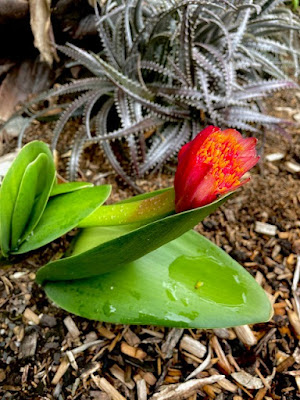DESIGN ELEMENTS
Warm Bulbs What Are They?
Spring flowering bulbs like daffodils, tulips, freesias, bluebells, to name a few are all bulbs from the northern hemisphere. They do best in cool climates and once the main spring show is over, there's nothing left to excite.- It's time to changeup or simply extend the flowering season to what garden designer Peter Nixon terms 'warm bulbs.'
- These come from warmer climates such as South Africa and South America, therefore are more suited to a large part of eastern Australia-the 'cool sub trops.' (Cool sub-tropical).
The other benefits of these spectacular bulbs are that they flower much later and longer; late spring into summer and even autumn.
Scadoxus multiflorus var. katarineae photo P. Nixon
We're starting of this 4 part series with 'bulbs for bright semi-shade.'
- The first group are Scadoxus species, some of which evergreen.
- This group DO NOT like low light levels, and poor drainage.
- If growing under a tree, the canopy must be well above so the bulbs are not shaded.
- Even morning sun would be good.
- Bulbs are the size of an onion.
- DO NOT bury the bulbs as you would a tulip are narcissus. The neck of these bulbs MUST be half-emerged.
Peter mentions these:
Scadoxus multiflorus var. katarinaea - Fireball Lily (but also
grows in Southern Highlands equating to higher altitude South Africa).
Scadoxus membranaceus -entirely staminate and surrounded with pale bracts.
 |
| Haemanthus albifloss |
I have some of these warm bulbs-namely two varieties of Haemanthus.
One flowers easily, and the other, I’ve yet to discover where it prefers to grow so it puts out the red paintbrush flower.
PLAY: Bulbs -bright semi-shade_16th June 2021
I'm talking with Peter Nixon, garden designer from Paradisus garden design. www.dgnblog.peternixon.com.au; www.paradisusgl.peternixon.com.au
Instagram paradisus_sea_changer FB Paradisus Garden Design
If you have any questions or feedback for me or Peter about these bulbs, why not write in to realworldgardener@gmail.com or info@peternixon.com.au
Warm Bulbs pt. 2-Harsh Western Aspect
Every garden has an aspect that’s hard to plant out because it’s either too shady or too harsh and dry or even spot that receives hot western sun .Today I’m focusing on bulbs that can give you a long display in the warmer months but have evolved to withstand hot and dry months.
 |
| Haemanthus coccineus photo M Cannon |
The bulbs in this group are in the Amaryllidaceae family which consists of mainly bulbs with long strappy leaves. The flowers are usually in an umbel-like cluster on a short or long scape.
Quite a few are known to have large showy flowers.
Haemanthus coccineus or 'blood lily likes an exposed location.
It will refuse to flowers if in a shady, lush location.
Don’t be like me and put the blood lily in too much shelter so the leaves grow long and the flower season trigger is missed.
- A dead give-away is if the leaves are quite long and extended, then the bulb is in too much shade.
You can also look for the interspecific hybrid of Haemanthus albifloss x H. coccineus
Brunsvigia gregaria which has agapanthus like flower on steroids in a crimson coloured bloom.
Or even the combined genus of brunsvigia and amaryllis ending up with Amarygia.
Let’s find out more by listening to the podcast with Peter Nixon
Or even the combined genus of brunsvigia and amaryllis ending up with Amarygia.
Let’s find out more by listening to the podcast with Peter Nixon
If you have any questions or feedback for me or Peter about these bulbs, why not write in to realworldgardener@gmail.com or info@peternixon.com.au




No comments:
Post a Comment